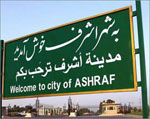 AFP: The United States Monday urged Iranian exiles to resume moving to a new camp near Baghdad, warning a current stalemate would harm a bid to be struck from the terror blacklist and could fan violence.
AFP: The United States Monday urged Iranian exiles to resume moving to a new camp near Baghdad, warning a current stalemate would harm a bid to be struck from the terror blacklist and could fan violence.  WASHINGTON (AFP) — The United States Monday urged Iranian exiles to resume moving to a new camp near Baghdad, warning a current stalemate would harm a bid to be struck from the terror blacklist and could fan violence.
WASHINGTON (AFP) — The United States Monday urged Iranian exiles to resume moving to a new camp near Baghdad, warning a current stalemate would harm a bid to be struck from the terror blacklist and could fan violence.
Under a deal between the United Nations and Iraq, some 3,000 members of the People’s Mujahedeen of Iran, also known as the Mujahedeen-e Khalq (MEK), are to relocate from their long-time base of Camp Ashraf to a new location, Camp Liberty.
But although about two-thirds of the refugees had decamped, the process has now stalled and no new relocations had happened since May 5, US officials said.
“The United States has made clear that cooperation in the closure of Camp Ashraf, the MEK’s main paramilitary base, is a key factor in determining whether the organization remains invested in its violent past or is committed to leaving that past behind,” State Department spokeswoman Victoria Nuland said in a statement.
The MEK has called on the United States to remove it from its list of terrorist organizations, and a US district appeals court has ruled that US Secretary of State Hillary Clinton must make a decision by October 1.
“The MEK has curtailed its contacts both with the Iraqi government and with the UN,” said one senior US official, asking to remain anonymous, adding “we are concerned by the prolonged stalemate.”
US officials said the People’s Mujahedeen may now believe that they have won their case and Clinton will have to delist them. Alternatively they could also be banking that a change of government in Iraq might allow them to stay.
Late Iraqi dictator Saddam Hussein had allowed the Mujahedeen to set up Camp Ashraf after he launched the 1980-88 war with Iran in which the group reportedly fought alongside his forces, and provided financial backing.
But senior administration officials warned Monday both calculations were an “over-interpretation” by the group.
“It appears that the MEK leaders believe that the secretary has no choice now but to delist them and that quite plainly is wrong,” said a second administration official, also asking to remain anonymous.
“The court has told her to deliver a decision one way or the other… so it is time for the MEK to recognize that Ashraf is not going to remain a MEK base. The Iraqi government is closing it, and any plan to wait out the government in the hope that something will change its mind is really quite dangerous.”
A spokesman for the National Council of Resistance for Iran denied the stalemate was to do with the court ruling or the political situation in Iraq.
Shahin Gobadi, from the council, said the main hurdle was “the non-implementation of the previous commitments and agreements by the Iraqi government and the UNAMI chief Martin Kobler.”
Gobadi alleged that the Iraqi government had diverted water, sewage and fuel tankers and refused to send them to Camp Liberty. In a statement, he said the residents wanted a specific timeline for connecting Camp Liberty to Baghdad’s water and power grid.
He also said Iraqi forces had prevented the transfer of some of the residents’ personal belongings, and that the group was calling for the recognition of Camp Liberty as a “refugee camp so that they could enjoy internationally recognized rights for refugees.”
Iraqi forces carried out raids on the camp in July 2009 and April 2011 that were said to have left 11 and 36 people dead respectively.
The Iraqi government has said it wants the camp in Diyala province closed by Ramadan, which is July 20, US officials said. The aim of the process is eventually to see the exiles resettled outside of Iraq.
The leftwing People’s Mujahedeen, which has been on the US terror blacklist since 1997, says it has now renounced violence. It was founded in the 1960s to oppose the shah of Iran, but took up arms against the country’s new clerical rulers after the 1979 Islamic revolution.


